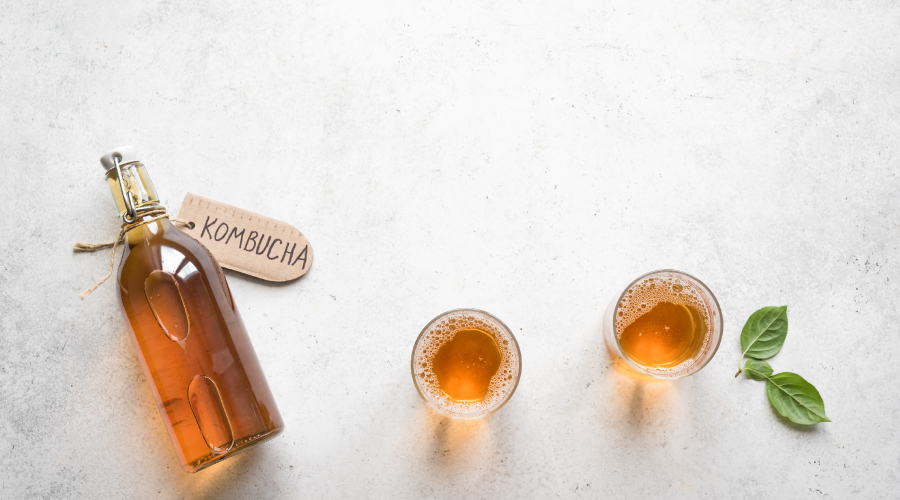

Kombucha is a fermented tea with an effervescent flavour due to healthy bacteria and yeast. The microbes used to prepare kombucha are called SCOBY or symbiotic cultures of bacteria and yeast. SCOBY is added to the sugared tea mixture and is left to ferment. The mixture is left for at least a week. The chemical reactions change the tea into a slightly carbonated drink consisting of a vital mixture of nutrients such as amino acids, enzymes, and vitamins. According to several studies, this drink is super rich in probiotics and antioxidants and hence has several health benefits. But this is yet to be scientifically proven. On the other hand, many rumours surrounding kombucha drink need to be busted.
Debunking Myths on Kombucha Drink
Let’s now look at several myths on kombucha tea and debunk them.
1. Home-Made Kombucha is Fatal for Consumption
Truth: Despite hundreds of years of kombucha consumption, there has never been a verified report of a fatality related to kombucha.
We advise conducting some research and making your own judgement. When introducing any new item to your diet, start with tiny portions and build them up gradually while monitoring your body’s response. Mould is the only significant concern while making kombucha at home. Mould is very easy to spot because of its blue, black, or white-fuzzy texture that develops on top of the culture. Throw the beverage away if you notice mould, just like you would throw away that stale bread slice. However, success is practically certain if you use a good culture, the right techniques and maintain hygiene.
Remember that there is very minimal risk of food-borne disease if cultured foods are cooked correctly.
2. More SCOBY Means Faster Fermentation
Truth: Although there isn’t concrete proof supporting either side of this claim, there are a few points to take into account.
It’s not always preferable to brew more quickly. The taste needs to develop properly and if there is a lack of time, the original kombucha flavour will not come about. More SCOBY will require more surface area, thereby shrinking the brewing liquid. This will ultimately produce less kombucha tea.
Getting a larger fermentation vessel could be a better approach to speed up the process. However, this solution can also result in a loss of desired taste.
3. Kombucha is a Mushroom
Truth: This commonly held opinion is most likely the result of the SCOBY’s unmistakable resemblance to a huge mushroom cap. As you are already aware, symbiotic culture of bacteria and yeast creates the kombucha culture. Although kombucha’s taxonomy has not been defined yet, yeast and mushrooms belong to the same fungi family. So accordingly, kombucha cultures also belong to the same family. But they are not related; they are distant cousins.
The fact that some of the earlier names for it in other languages used the word “mushroom” further adds to the confusion. The moniker “kombucha mushroom” was coined as a result of the translation of old cultural names of the drink.
4. Metal Will Destroy Kombucha Drink
Truth: As kombucha has remarkable detoxifying effects, grave and highly exaggerated advice to prevent even a brief period of contact with metal are everywhere. A hazardous SCOBY or contaminated brew won’t result from a brief encounter with anything such as a metal strainer or spoon. However, glass should be the only material used to brew kombucha. The potential of nickel leaching into the brew while using stainless steel bowls exists.
5. Freeze SCOBY to Prevent It from Rotting
Truth: This tale is exaggerated in the name of “to keep it from decaying” or “to put it to sleep.” In actuality, when stored correctly, SCOBYs never rot. The microbes that protect the mixture and maintain the SCOBY’s health go dormant in low temperatures and are unable to mount a fight against mould. When a SCOBY that has been stored in the refrigerator is activated, the initial batches may (or may not) work, but soon, mould will probably start to grow in the brew.
6. Kombucha Causes Acidity
Truth: There is an ongoing debate about whether following a full acid/alkaline diet is beneficial for one’s health. The point is that we do not know whether the various forms of food we eat leave an acidic or alkali form of residues. The main point is that the body will suffer in either of the extreme positions. So, what is required at the moment is a balanced diet.
What about consuming kombucha drink, then? Will the body become more acidic due to the low pH (which you have likely been advised to avoid)? No. While kombucha does have a low pH (2.5-3.5), its residue is alkaline-forming and not acidic and therefore, does not cause acidity. It functions very similarly to lemon juice and apple cider vinegar.
7. Kombucha is a miracle cure
Truth: Kombucha isn’t a miracle cure. The body progressively detoxifies with kombucha tea, allowing the immune system to work correctly. Imagine it as a filter cleaner, with your liver serving as the filter. It is an adaptogen, which means it is non-toxic, works for the entire body, and aids in maintaining the body’s homeostasis.
Conclusion
The evidence for kombucha’s health benefits on human bodies might be limited. But the benefits of antioxidants and probiotics—both of which are included in kombucha—are well supported by scientific research. Moreover, it is identified as a non-toxic, antimicrobial and non-specific adaptogen.
Go through the myths on kombucha tea and check on your own. If you want to try kombucha, you can either go for readymade ones or try making your own. Do ensure you follow all the right steps while making kombucha at your home.




